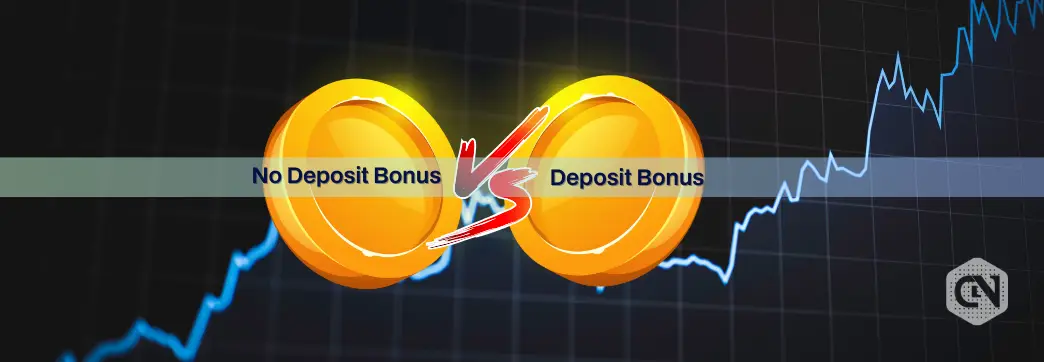Did you know that Forex trading markets are the only financial markets that are open 24 hours a day? The daily trading volume of forex markets comes to around $6 trillion. Forex trading has many advantages for traders, such as low trading fees, high liquidity, and higher profits. Moreover, forex trading offers several kinds of bonuses, such as welcome bonuses, deposit bonuses, and no-deposit bonuses.
Overview of Forex Bonuses
Forex Bonuses are rewards that are primarily given to new traders and inexperienced traders by forex brokers in order to attract more clients. For traders, it allows them to earn extra profits, while some forex bonuses help traders earn money from trading without investing money.
Types of Forex Trading Bonuses
There are primarily two main types of forex bonuses: Deposit bonus and No deposit bonus.
1. No Deposit Bonuses
What is a No Deposit Bonus?
Forex brokers provide promotional offers to forex trailers that do not require them to deposit any funds. These offers are known as No Deposit Bonuses.
How No Deposit Bonuses Work?
Forex brokers employ no deposit bonuses as one of their most appealing offers to attract new traders to the forex trading industry. While new or inexperienced traders are intrigued by forex trading, they are reluctant to invest their own money to participate. This provides new traders to experience trading in real-time with real funds without incurring any costs.
Advertisement
When it comes to No Deposit bonus vs. Deposit bonus, each has their own strengths and disadvantages.
Advantages of No Deposit Bonuses
- Risk-free trading: No deposit bonuses allow traders to experience trading without the risk of having to lose their capital or funds in forex trading.
- Ideal for beginners: Beginner-level traders can take advantage of no deposit bonuses to explore the possibilities before committing to forex trading.
- Opportunity to test brokers’ platforms: No deposit bonuses are a win-win situation, therefore they are an excellent opportunity for traders to become acquainted with a forex broker’s trading platform, software, and terms.
2. Deposit Bonuses
What is a deposit bonus?
A deposit bonus is a promotional offer that provides additional funds to a forex trader, enabling them to increase their revenue and trading volume, thereby attracting more business. Top Forex brokers provide deposit bonuses in the form of welcome bonuses or ordinary VIP deposit bonuses for loyal customers.
How do Deposit Bonuses Work?
Forex deposit bonuses are often added to a customer’s account either as a welcome bonus, i.e., when a new trader opens a new account with the broker, the broker might add a sum of money as a reward for signing up. For instance, if a new client adds $2000 to their forex account, the forex broker might add $250, so the trader will have a total of $2250 to trade.
Advantages of Deposit Bonuses
- Higher bonus amounts: When it comes to no deposit bonuses vs. deposit bonuses, the latter offers higher bonus amounts. Additionally, traders are unlikely to make more profits with no deposit bonuses, whereas deposit bonuses offer higher profit margins.
- Enhanced Trading Capital: A deposit bonus provides traders with additional funds to invest in larger positions or spread their trades. Such funds allow traders to have more profits and help traders opt for diversified trading strategies, ones including fewer risks and excessive capital allocation.
- Incentives for large deposits: Deposit bonuses in forex trading offered by forex brokers provide high incentives. Most often, brokers offer higher percentage rates on larger deposits to encourage more traders to make deposits. In the case of no deposit bonuses vs. deposit bonuses, the latter provides the edge required when trading capital is limited.
Key Differences Between No Deposit and Deposit Bonuses
| Aspect | No Deposit Bonus | Deposit Bonus |
|---|---|---|
| Bonus Amounts | Lower bonus amount. Eg: $10 to $50 | Higher bonus amount. Eg: $100 to $500 |
| Financial Commitment | No deposit amount required | Deposit amount required |
| Withdrawal Conditions | High trading volumes before withdrawals are allowed | Low trading volume before withdrawals are allowed |
| Trader Suitability | Beginner-level traders | Experienced traders |
| Risk Involvement | Risk-free involvement | Non-risk-free involvement |
| Bonus availability | Low availability | High availability |
| Incentive for Broker | Brokers need to display their trading platform. | Brokers do not need to display their platform. |
| Over-leveraging Risk | Lower risk of over-leveraging due to small bonus amounts. | Higher risk of over-leveraging due to higher bonus amounts. |
Conclusion
Advertisement
When it comes to choosing a deposit bonus, there is no one-size-fits-all solution. Depending on individual goals, new traders should opt for no deposit bonuses to familiarize themselves with the trading environment before fully committing, as these bonuses are risk-free. However, for experienced traders, a deposit bonus would help maximize profits rather than shifting to a new forex brokerage.
While no deposit bonuses provide lower bonus amounts, deposit bonuses provide relatively higher amounts to incentivize traders to deposit more funds and expedite high volumes of trading. Additionally, it is important to consider one’s trading strategies when selecting forex bonuses.

